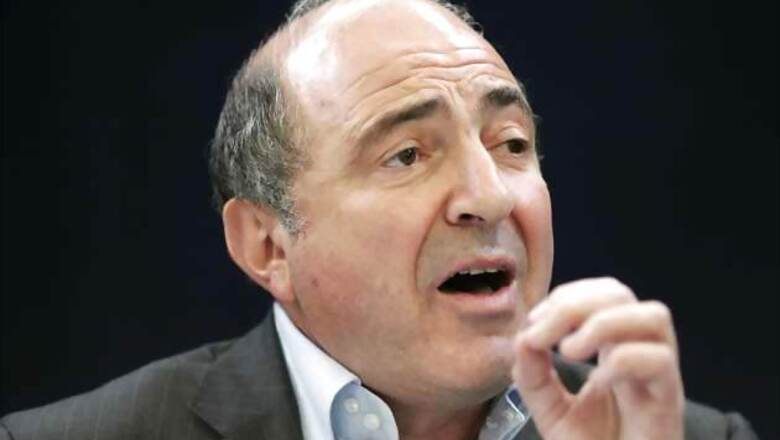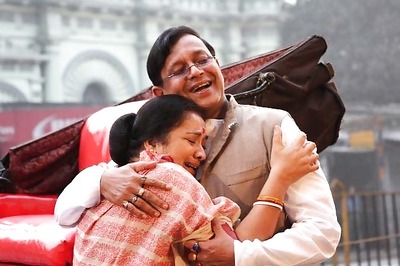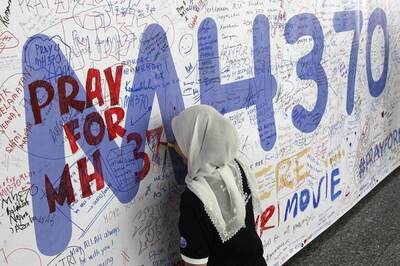
views
London: Russian oligarch Boris Berezovsky, whose body was found in the locked bathroom of his luxury mansion near London over the weekend, died by hanging, British police said on Monday. An autopsy showed no signs of a violent struggle but further tests would be carried out, including toxicology and histology examinations, police said.
Once known as the grey cardinal of Kremlin politics, the former billionaire power broker helped Vladimir Putin come to power before fleeing in 2000 for Britain where he became one of the fiercest critics of Russia's new elite. The 67-year-old Berezovsky's body was found in his sprawling property in Ascot, an affluent town a few miles (kilometres) from Queen Elizabeth's Windsor Castle, on Saturday.
His associates had hinted Berezovsky might have killed himself because he had been severely depressed after losing a bruising $6 billion court battle last year against another Russian tycoon, Roman Abramovich. "The results of the post-mortem examination, carried out by a Home Office pathologist, have found the cause of death is consistent with hanging," police said in a statement. "The pathologist has found nothing to indicate a violent struggle." Results of further tests are likely to take several more weeks to announce, police said.
The apparent suicide of one of the most powerful of the so-called oligarchs marks the end of an era for many Russians, an epoch where he symbolised the cut-throat world of Russia's new form of capitalism that followed decades of communist rule. From his self-imposed exile in London, the chosen home of many business figures and dissidents who have fallen foul of the Kremlin, he vowed to overthrow the Russian leader whom he cast as a corrupt "bandit" backed by ex-KGB spies.
Always surrounded by controversy and conspiracy theories, Berezovsky survived several assassination attempts throughout his eventful life, including a bombing that decapitated his driver. His friends and associates have said he felt devastated after losing a legal battle against former partner Abramovich over shares in Russia's fourth-biggest oil company in 2012.
At the time, British Judge Elizabeth Gloster humiliated him publicly by saying he was an "unimpressive and inherently unreliable witness" who would say "almost anything to support his case."
An impulsive and fast-talking character, Berezovsky lived the adrenaline-fuelled life of Russia's A-team of oligarchs, known for his love of cognac, beautiful women and an ability to talk well into the night. He suffered another blow in 2011 when he was forced to pay one of Britain's biggest-ever divorce settlements to his former wife Galina, and local media have reported that the settlement was believed to be more than $100 million.
Berezovsky had been known as the "godfather of the Kremlin" and wielded immense influence in politics and business during a violent decade that followed the collapse of the Soviet Union. Once in exile, he often said he feared for his life, particularly after his friend and former Russian spy Alexander Litvinenko died from radioactive polonium poisoning in 2006.
In Russia, Kremlin allies and pro-government media pressed ahead with portrayals of Berezovsky as a beaten man who had begged Putin's forgiveness in a last-ditch effort to return to his homeland. Berezovsky's friends in London have denied this.
Nationalist lawmaker Vladimir Zhirinovsky said he had met Berezovsky by chance in the Israeli resort of Eilat in January, and that Berezovsky had said he would do "anything Moscow and the Kremlin told him" in order to return to Russia.
"The only condition (Berezovsky named) was a decree pardoning him" for the crimes he has been convicted of in Russia, Zhirinovsky told the Russian newspaper Izvestia in an interview published on Monday.
A former mathematician, Berezovsky made millions running post-Soviet car dealerships and expanded his business empire massively throughout the 1990s. He was one of a handful of well-connected businessmen who became instant billionaires under former president Boris Yeltsin when the state arranged for them to buy giant state owned companies for what quickly proved to be a fraction of their value.
As one of the central figures in Yeltsin's inner circle, he helped forge the career of Yeltsin's hand-picked successor Putin, an obscure and quiet official named prime minister in 1999 and acting president when Yeltsin resigned on millennium eve. After Putin was confirmed in the presidency in an election in 2000, Berezovsky quickly fell out with him and left for Britain from where he consistently denounced his former ally as corrupt.
















Comments
0 comment